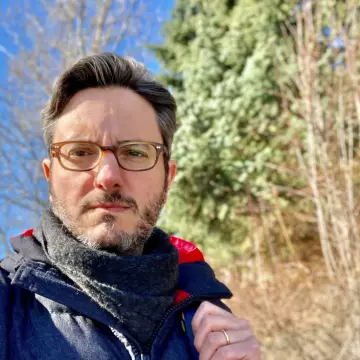Siste fra forsiden:
Kortnytt
Norsk Polarinstitutt får sitte ved viktig bord
Norsk Polarinstitutt er fra januar 2026 tatt opp som fullverdig medlem av European Polar Board. Medlemskapet gir instituttet en sterkere rolle i Europas viktigste samarbeidsorgan for polarforskning, infrastruktur og politikk.
Det melder Norsk Polarinstitutt selv.
European Polar Board (EPB) samler ledende forskningsinstitusjoner og forskningsråd fra hele Europa som jobber med Arktis og Antarktis. Organisasjonen fungerer som et strategisk knutepunkt for samarbeid om forskning, datadeling, felles infrastruktur og langsiktige observasjonssystemer – og bidrar til å koordinere Europas samlede innsats i polarområdene.

Camilla Brekke, direktør ved Norsk polarinstitutt,. Elin Vinje Jenssen /Norsk Polarinstitutt Norsk Polarinstitutt har lenge deltatt i EPB gjennom Norges forskningsråd, men får nå en selvstendig stemme inn i arbeidet som former Europas polarstrategi.
– Å bli fullverdig medlem markerer et viktig, nytt kapittel for oss. Internasjonalt samarbeid er helt avgjørende for å forstå de raske endringene som skjer i Arktis og Antarktis, sier direktør ved Norsk Polarinstitutt, Camilla Brekke
Søker trygghet når de velger utdanning
For åtte av ti unge er muligheten for sikker jobb det viktigste når de skal velge utdanning. Men halvparten mener det er vanskelig å finne god informasjon om hvilke jobbmuligheter studiene gir.
Det viser en ny rapport fra Rambøll på oppdrag for Direktoratet for høyere utdanning og kompetanse (HK-dir).

Immatrikulering av nye masterstudenter ved NHH. De fleste unge er mest opptatt av sjansen for sikker jobb når de velger utdanning, ifølge undersøkelse. Glenn J. Mangerøy – I dag mangler vi kompetanse på flere områder, og det vil være gode jobbmuligheter i en rekke bransjer fremover. Undersøkelsen viser at vi kan bli enda bedre på å gi de unge informasjon. Det kan gjøre det lettere å ta gode utdanningsvalg og få flere søkere til utdanninger som arbeidslivet trenger, sier forsknings- og høyere utdanningsminister Sigrun Aasland (Ap) i en pressemelding.
Rambøll-undersøkelsen viser at 81 prosent sier det er viktig at «det kommer til å være behov for folk med denne utdanningen i fremtiden». De er mindre opptatt av forhold som status, høy lønn, muligheter for utenlandsarbeid og hvor enkelt det er å fullføre studiet.
Samtidig svarer 48 prosent av de spurte i undersøkelsen at det er vanskelig å finne informasjon om arbeidsmarkedene og mulighetene for å få jobb, og de fleste synes det er vanskelig å velge riktig utdanning.
1500 personer mellom 15-25 år deltok i undersøkelsen.
Endrer stipendregler for studenter etter sykdom
Studenter skal nå få en mer rettferdig behovsprøving, ifølge regjeringen, som vil endre regeleverket. Etter dagens praksis for behovsprøving i Lånekassen kan studenter få mindre i stipend fra Lånekassen dersom de har mottatt erstatning som følge av kritisk sykdom eller personskade.

Statsråd Sigrun Aasland sier hun ønsker en mer rettferdig ordning. Espen Halvorsen Bjørgan – Personer som har vært gjennom alvorlig sykdom eller skade, skal ha samme mulighet til å ta høyere utdanning som alle andre. Det er ikke rimelig at erstatningen de mottar, skal føre til lavere stipend fra Lånekassen. Derfor endrer vi nå praksis og sørger for en mer rettferdig behandling, sier forsknings- og høyere utdanningsminister Sigrun Aasland (Ap) i en pressemelding.
Regjeringen vil foreslå å endre Lånekassens praksis for behovsprøving av stipend i revidert nasjonalbudsjett 2026.
Den nye praksisen vil innebære at personer som har fått erstatning grunnet kritisk sykdom eller personskade, vil få den forventede avkastningen på erstatningsbeløpet holdt utenfor behovsprøvingen når stipend skal beregnes. Erstatningsbeløpet er allerede unntatt fra behovsprøving i dag.
Endringen skal også gjelde tidligere studenter som har fått redusert stipend som følge av dagens praksis. Studenter som tidligere har fått redusert stipend på grunn av erstatningsutbetalinger, vil kunne be om ny behandling av saken. Den enkelte må selv ta kontakt med Lånekassen for å få dette.
To drepne i skyteepisode på universitet i USA
To personar mista livet og ein blei skadd i ein skyteepisode ved South Carolina State University i USA torsdag kveld.
Hendinga skal ha funne stad i ein eit bygg med studentbustader på ein av campusane til universitetet, ifølgje ABC News. Ingen detaljar er kjende om eventuelle mistenkte for ugjerninga.
Det har også tidlegare vore skyting på den same universitetscampusen. I Oktober 2025 mista ein person livet og ein annan vart skadd i ein skyteepisode.
Der er om lag 2800 studentar ved universitetet.
Sju søkere fra fire land til stilling i kvensk
Søkerne til en ny postdoktorstiling innen kvensk kultur, historie, språk eller samfunn kommer fra fire land, melder Ruijan Kaiku, en avis som primært skriver for og om kvener og kvenske forhold.
Totalt har sju personer søkt på stillingen.

UiT har ansvar for kvensk. David Jensen/UiT – Vi er fornøyde med både antallet søkere og den faglige bredden blant dem, sier Trine Kvidal- Røvik, prodekan og professor ved UiT Norges arktiske universitet.
UiT har et særskilt ansvar for det kvenske, og stillingen er finansiert med strategiske midler.
Fire av søkerne kommer fra Norge, de tre andre fra Sør-Korea, Sverige, Frankrike.
– Vi ønsker å styrke universitetets arbeid med kvensk språk, kultur og samfunn. Det er derfor positivt for hele universitetet, og ikke bare for vårt fakultet, at vi har kunnet lyse ut denne stillingen, sier Røvik til Ruijan Kaiku.
Vikingtidsmuseet mangler 200 millioner
Vikingtidsmuseet risikerer å måtte stenge etter åpningen, melder Uniforum. Planen, eller det museumsdirektør Aud Tønnesen ifølge Uniforum kaller Universitetet i Oslos drøm, er at museet skal åpnes 1. november 2027.

Det gamle vikingskipsmuseet skal bli del av det nye Vikingtidsmuseet. Men det mangler penger til å fullføre rehabiliteringen. © FOTO TROND ISAKSEN/STATSBYGG Nå er det fare for at museet må stenge igjen etter åpning, ifølge direktøren. Grunnen er pengemangel og behov for rehabilitering av vegger, vinduer og tak.
Det siste er kritisk, for dersom vinduene må restaureres etter åpning, vil vi ikke kunne holde museet åpent, sier Tønnessen til Uniforum.
Rundt 200 millioner kroner mangler fortsatt for å kunne gjennomføre de nødvendige tiltakene.
Tønnesen viser til at regjeringen i 2022 kuttet i funksjoner i prosjektet tilsvarende 250 millioner kroner. Dette året ble det klart at Vikingtidsmuseet kom til å bli en milliard kroner enn planlagt.
— Da nedskalerte regjeringen prosjektet og gjorde kutt som fjernet sentrale og helt nødvendige publikumsfunksjoner, sier Tønnesen.
Universitetsmuseum satte rekord
Norges arktiske universitetsmuseum satte publikumsrekord i 2025. Samlet registrerte museets fire avdelinger 270 813 besøk i fjor – en økning på 5 313 fra året før. Størst økning hadde Botanisk hage, melder UiT Norges arktiske universitet.

Norges arktiske universitetsmuseum er blitt stadig mer populært, melder UiT. David Jensen, UiT Norges arktiske universitet Også ved Polarmusset var besøket godt, og mye av aktiviteten skjer i vintermånedene. Både i februar og mars ble det registrert over 16 000 besøkende – aldri før har besøkstallene vært så høye i enkeltmåneder. Totalt besøkte 134 007 personer museet i 2025.
Også ved Norges arktiske universitetsmuseum holdt besøkstallet seg stabilt høyt, med over 60 000 gjester i løpet av året.
– Vi er stolte og glade for at så mange besøker våre arenaer. Sjelden har forskningsformidling vært viktigere, og våre arenaer gir mangfoldig og rik kunnskap om nord, sier Lena Aarekol, direktør ved Norges arktiske universitetsmuseum og akademi for kunstfag.
Åpner forskningssenter mot digital svindel
NTNU oppretter et nytt forskningssenter med mål om å utvikle teknologi og kompetanse som skal reduserer digital svindel i finanssektoren. Senteret skal ha base på Gjøvik og har fått det engelske navnet Secure Anti Fraud Excellence Center (SAFE).

NTNU på Gjøvik står i spissen for det nye senteret Secure Anti Fraud Excellence Center NTNU Senteret er etablert som et femårig prosjekt med en samlet investering på 50 millioner kroner frå eksterne partnere: Sparebankstiftelsen Hedmark, Sparebank1 Østlandet og teknologiselskapet Mobai.
Ved NTNU vil prosjektet bestå av fem forskere i oppstarten. Gjennom fem år skal SAFEutvikle seg mot målet om å bli et nasjonalt senter for forskning på digital svindel og biometrisk sikkerhet. Professor Raghavendra Ramachandra ved NTNU skal lede den faglige utviklingen av SAFE.
Ifølge Finanstilsynet ble det rapportert inn over 1,2 milliarder kroner i svindeltap i 2024, en dobling siden 2022. Svindlernes metoder blir stadig mer sofistikerte og vanskeligere å avsløre.











